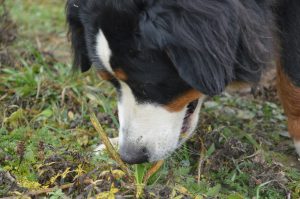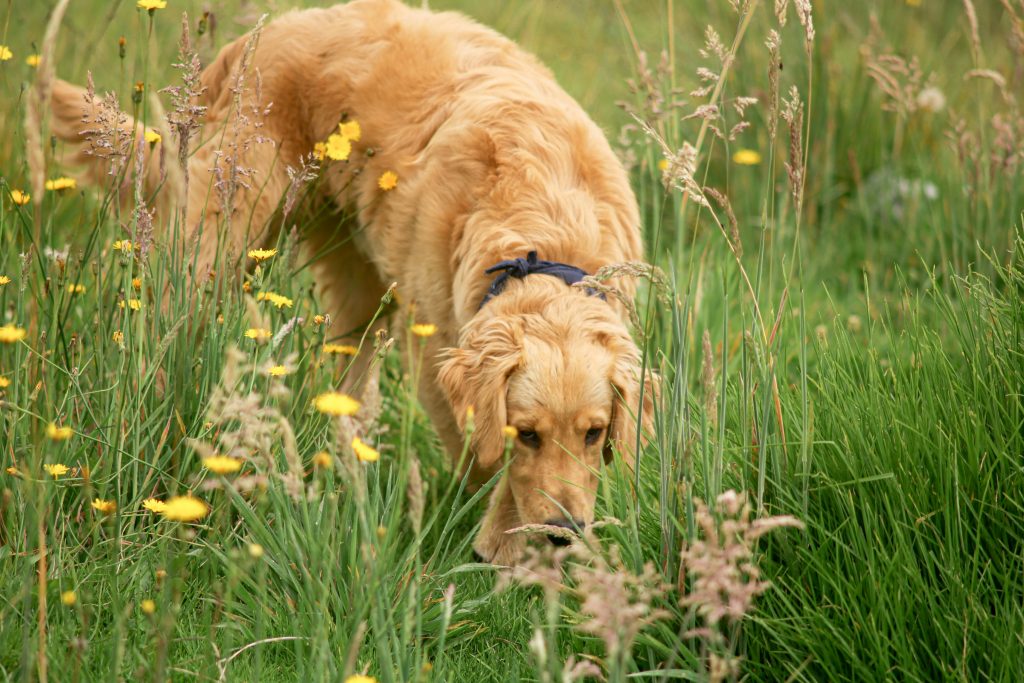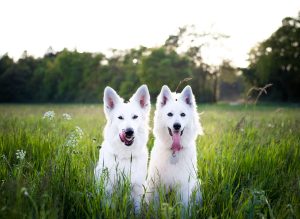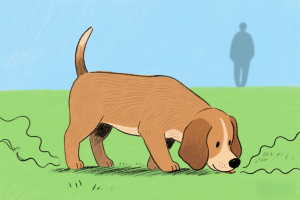Recently, I’ve noticed that Luna keeps eating grass and then throwing it up afterward. So why do dogs eat grass?
-
Instinctive Behavior and Genetics
Dogs’ ancestors (wolves) would often eat the undigested plant material in their prey’s stomach. These plant fibers helped with digestion. Even though modern pet dogs no longer need to hunt, this instinct to consume plants may still be present.
-
Improving Digestion or Relieving Stomach Discomfort (The Most Common Explanation)
Inducing Vomiting: This is the most well-known reason. When dogs feel stomach discomfort (perhaps due to eating something they shouldn’t, indigestion, excessive stomach acid, bloating, or mild inflammation), they may instinctively eat grass. The rough edges of the grass leaves can irritate the throat and stomach lining, triggering a vomiting response to expel the uncomfortable substances from their stomach.Promoting Gut Motility: Grass is rich in fiber, which can help promote intestinal movement, even if it doesn’t cause vomiting. This can relieve constipation or help pass foreign objects (such as hair) in the intestines, similar to how humans eat high-fiber foods for bowel movements.Neutralizing Stomach Acid: Some believe that eating grass may temporarily neutralize excessive stomach acid, helping to alleviate heartburn.
-
Nutritional Supplement
Grass contains certain substances that may be lacking in a dog’s diet, such as folic acid, vitamins (like vitamin K), minerals, fiber, or certain plant enzymes. While commercial dog food is generally balanced, some dogs may seek these supplements due to a limited or incomplete diet, or specific nutritional needs. However, relying on grass for nutrition is inefficient and carries risks.

-
Pure Behavior and Sensory Enjoyment
Curiosity and Exploration: Especially with puppies, dogs like to explore the world with their mouths. The taste, texture, and juice from grass are novel to them.Enjoying the Taste/Texture of Grass: Some dogs simply find certain grasses taste good or enjoy the sensation of chewing on grass leaves (similar to how humans chew gum).Stress or Anxiety: In rare cases, stressed dogs may develop pica, eating grass or other non-food items.
-
Why Do Dogs Often Vomit After Eating Grass?
Inducing Vomiting: As mentioned, this is the primary reason. When dogs feel stomach discomfort, they instinctively eat grass, using its physical characteristics (rough leaves) to irritate their throat and stomach, triggering a vomiting reflex to expel whatever is making them uncomfortable (such as spoiled food, hair, excess stomach acid, etc.). After vomiting, dogs typically feel better.Stomach Discomfort: Dogs’ digestive systems are not designed to handle large amounts of grass. The cellulose in grass is hard for them to digest, especially in coarser, tougher grasses. Grass leaves can irritate the stomach lining or intestines, causing physical irritation or mild inflammation.Issues with the Grass Itself: Residual Chemicals on Grass: Grass can have pesticide, herbicide, fertilizer, insecticide, car exhaust pollutants, animal feces, or parasite eggs on it. These toxic or harmful substances can irritate the digestive system, leading to vomiting or even poisoning.Occasional, Small Amounts of Grass Eating is Normal: If a dog occasionally nibbles on some grass and doesn’t experience any adverse effects (normal energy levels, appetite, and bowel movements with no vomiting), it’s usually not something to worry about. It’s simply a natural exploration or mild self-regulating behavior.
If your dog’s grass-eating behavior suddenly increases or becomes unusually persistent, or if it’s accompanied by vomiting or other signs of discomfort, it’s crucial to consult a veterinarian promptly to rule out potential health issues.Beware of Hazardous Grass: Always avoid letting your dog eat grass from lawns that have been treated with pesticides, herbicides, or fertilizers, or from public areas where such chemicals may be present. The risk of toxicity is very high! For the health of your furry friend, safety should always come first!





